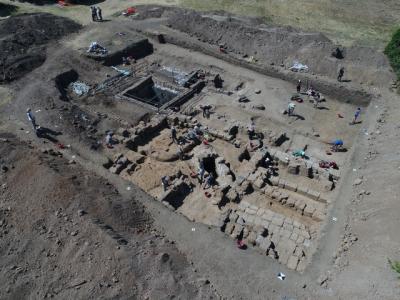The Beginnings of Roman Imperialism: Rome and Caere.
Dr. Fabio Colivicchi has received a five-year, $100,000 SSHRC grant for continued research at Caere.
To follow is his description of the project and its objectives.
Roman imperialism has long been a major topic of historical interest, both in academic and popular culture, and has played a major role in the intellectual and political debate up to the present day. Significant questions continue to be asked: How was it possible for the Romans to be so successful in their conquests? Why is the evidence for continued resistance to Roman expansion so limited, particularly during the conquest of Italy? How could such a vast and diverse empire preserve its unity for so long? Scholars have proposed a wide range of answers to these questions, but for the most part they have been based on a more or less explicit assumption that the Roman Empire was the archetype of modern imperialism. Only recently a new approach is emerging, which stresses the fundamental differences between Roman and modern imperialism and accounts for the agency of the non-Romans. This is especially applicable to the early phases of Roman expansion, when the Roman senate included numerous families from Central Italy who maintained close ties with their places of origin. What, on the surface, may once have appeared to have been an act of aggression perpetrated by Romans on a neighboring community for territorial gain may in fact have been an initiative engineered by aristocratic factions both in Rome and within those communities whose interests would have been best served by absorption into the expanding Roman state.

This new model, while promising, needs to be vigorously tested against archaeological evidence. The investigation of the Etruscan city of Caere provides an ideal case study. The city was absorbed by Rome in 273 BC in circumstances that suggest the involvement of an aristocratic network crossing political and ethnic boundaries. The historical record for Caere, moreover, is unique for the presence of inscribed monuments directly related to the Roman conquest, as well as the abundance of well-preserved remains for the phases under investigation. The project will evaluate the traditional views on the nature and consequences of Roman imperialism, which have posited that there was some rapid crisis in Caere's urban centre. The incorporation of new archaeological evidence will allow us to determine the degree to which fresh and alternate narratives are probable. The proposed approach represents a departure in scope and goals from the field research traditionally done in Etruria. The excavation will also take full advantage of the rare opportunity of dating archaeological contexts through their connection to historical events. This will allow us to reassess the criteria for dating the material culture of the 4th and 3rd century BC, an operation that will have important consequences for the study of the process of Roman expansion throughout central Italy that occurred during this period.
The new view of Roman imperialism being tested at Caere has much to offer to all disciplines of the humanities and social sciences. If the Roman Empire is no longer perceived as a paradigm for imperial expansion (whether admired or despised), then the dialogue among Classics and other disciplines can be reopened on new and more fertile ground. The development of new models for ancient and modern imperialism is not only of relevance to scholarly and cultural debate, but also to public discourse about the nature of integration, citizenship, and supra-national organizations in contemporary societies.
The project is innovative not only in its research objectives, but also in the strategy for management of data and dissemination of results. The development of an open access tool containing all the excavation data, as well as the application of 3D visualizations, will answer the pressing need for new ways of sharing data with the academic community and beyond, and will create new standards for best practices within the discipline.
